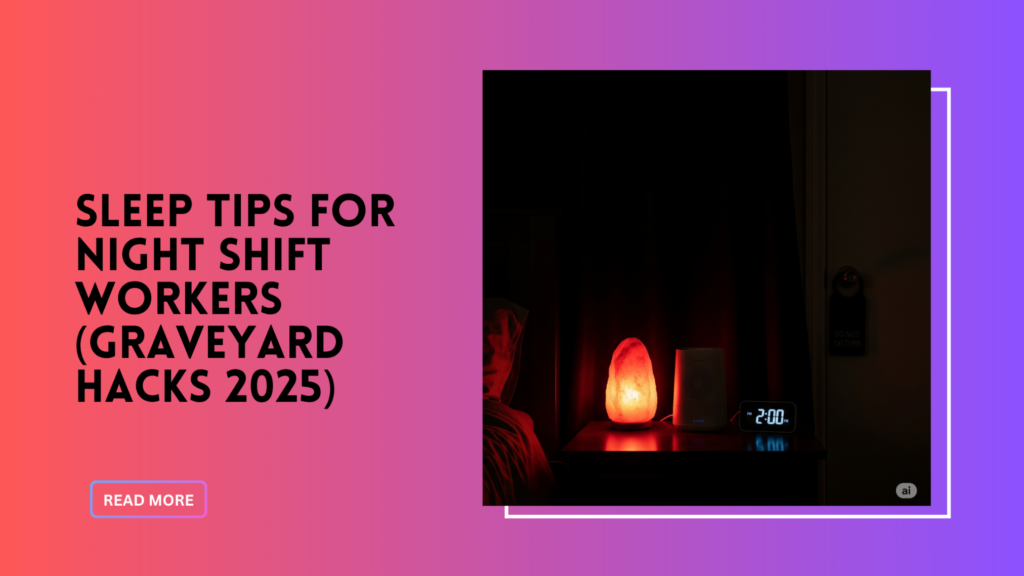Working night shifts for seven years has taught me something: sleep isn’t just a luxury — it’s survival. And no, it’s not just about blackout curtains and earplugs. It’s about learning how to rewire your entire life to work against nature… and somehow still wake up functional.
When I started, I made all the classic mistakes: lying in bed at 10 a.m. pretending the city wasn’t honking outside, trying to “catch up” on sleep on weekends, and wondering why I constantly felt like a zombie with caffeine breath.
Through trial, error, actual science, and crying into Reddit threads at 3 p.m., I built a real system that works. This guide? Everything I wish someone had handed me when I took my first graveyard shift.
Why Night Shift Sleep Is So Broken (and It’s Not Just the Noise)
Melatonin wants you to sleep in the dark. Cortisol wants you to be awake in the morning. Guess what night shifts ask you to do? The opposite of both.
Add to that:
-
Honking cars.
-
Family drama.
-
Banks, doctors, and the world operating like your sleep schedule doesn’t exist.
This is more than just “get more rest” advice. It’s a circadian jailbreak. And it starts with your cave.
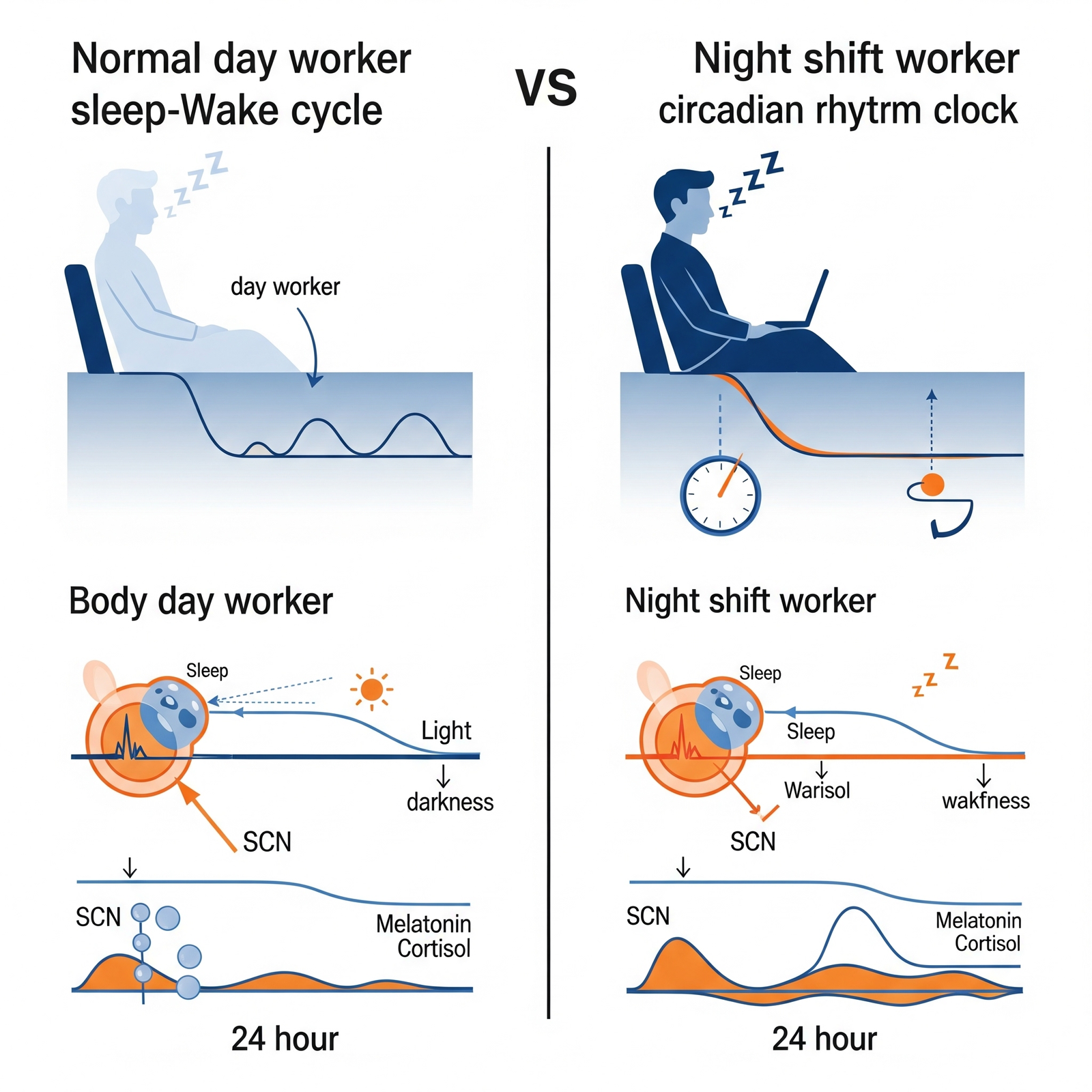
Make Your Bedroom a Sleep Cave, Not a Day Prison
Essentials for night shift sleepers:
-
Total darkness: Blackout curtains, blackout blinds, and if that fails? Aluminum foil. Yes, we’re going full tinfoil mode.
-
Cool temperatures: Keep it between 65–68°F (18–20°C). Use fans, breathable sheets, and avoid sleeping in a microwave (aka closed room with no airflow).
-
Kill the noise: Brown noise, white noise, fan noise, anything-but-the-dog-barking noise. Plus: warn your neighbors and family. Repeatedly.
The Wind-Down Routine That Actually Works
Treat sleep like a performance. You need a pre-show ritual.
Mine:
-
Last hour of my shift: Dim lights, no arguments, and zero caffeine.
-
Drive home: Sunglasses. Always. Even in fog.
-
At home: Light, sleep-friendly meal (carbs + tryptophan, skip the biryani).
-
Shower or bath: Trick your body into cooling down post-hot water = faster sleep.
-
Final 30 mins: No screens. No doomscrolling. Just audiobooks, stretching, or meditation.
Repeat it until your brain starts saying, “Ah yes, the bedtime cult is assembling.”
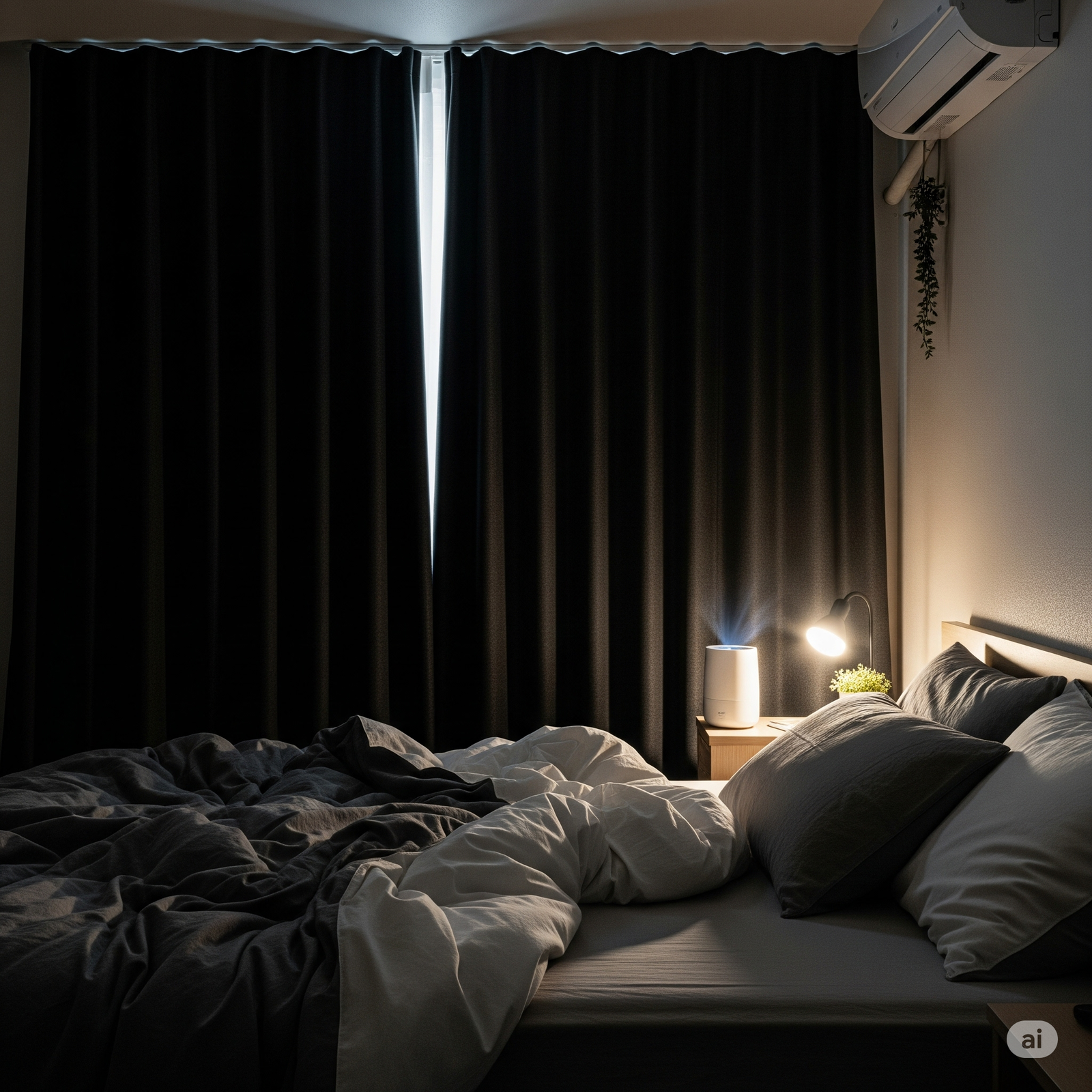
Use Light Like a Weapon (Because It Is One)
-
Bright light = stay awake.
-
Dim or no light = get sleepy.
Before your shift: Get bright light exposure in the first 4 hours (artificial lamps work).
End of your shift: Switch to low blue light or darkness.
Post-nap wakeup: Use a light therapy box for 20–30 mins to reset your circadian rhythm.
It’s like Jedi mind tricks but for your hormones.
Eat Like a Vampire Who’s Also a Nutritionist
-
Post-shift “breakfast” = your dinner.
-
Keep it light, carbs > protein, no sugar bombs.
-
Avoid caffeine 6+ hours before sleep (yes, even “just one cup”).
-
Hydrate early in your shift. Taper off before bed unless you enjoy peeing at 3:17 p.m.
Master the Nap. Rule the Shift.
-
Pre-shift nap: 20–30 minutes, 1–2 hours before work. You’re not lazy. You’re tactical.
-
Mid-shift nap: 15–30 mins if allowed. Sleep mask + brown noise = secret weapon.
-
Emergency nap (car edition): If you’re falling asleep driving home, pull over and power nap for 15–20 mins. Better late than dead.
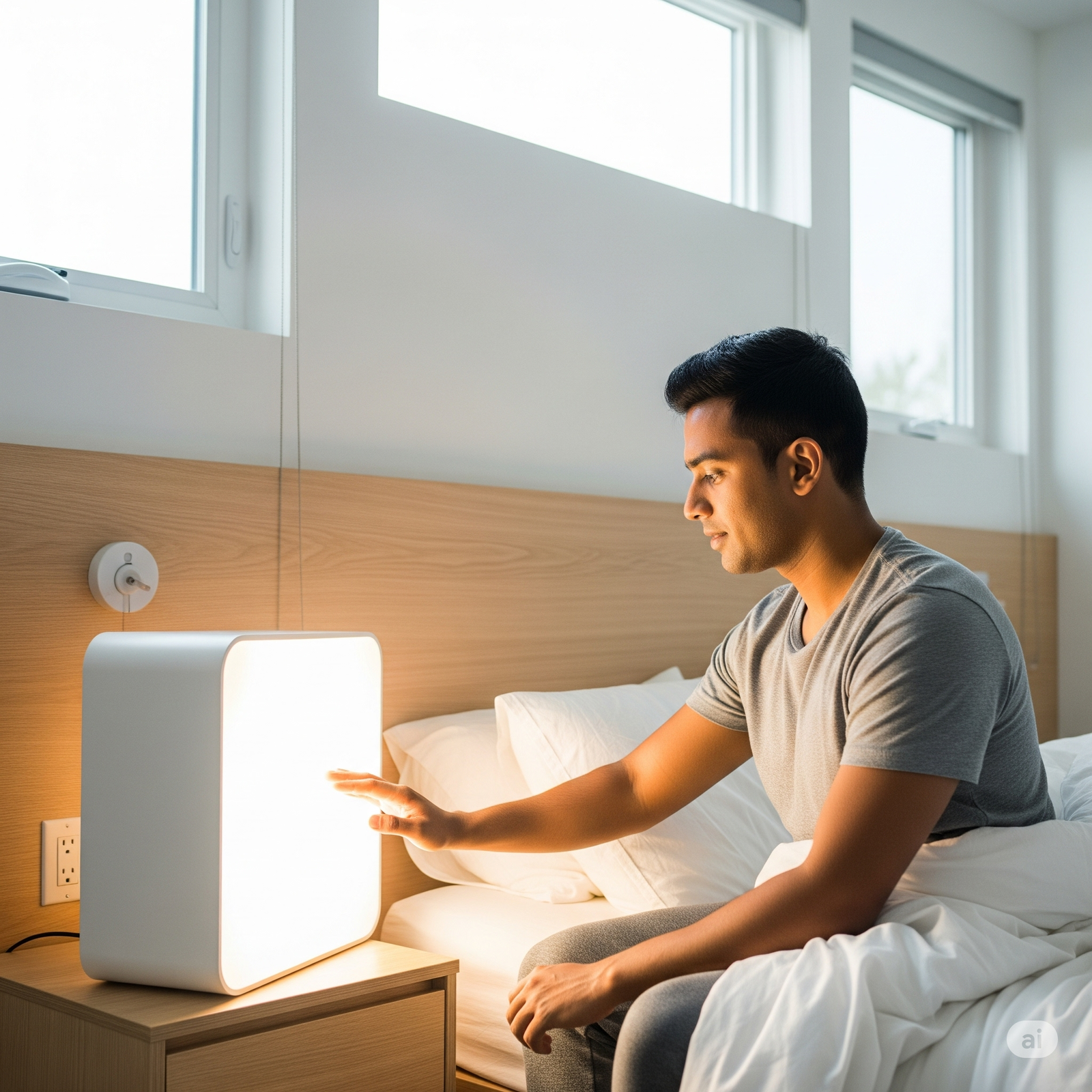
How to Make People Respect Your Daytime Sleep (Even When They Don’t Get It)
-
Tell them. Again.
-
Use DND mode.
-
Make one person your emergency contact.
-
Hang a sign if you must: “Sleeping = Living. Disturb me only if the building’s on fire.”
What About Sleep Aids? Here’s the Real Deal
-
Melatonin: Use 0.5–3mg, 30–60 mins before bed. Not a magic pill. Works best with routine.
-
Magnesium Glycinate: Relaxing, gentle, and unlikely to mess with your stomach.
-
Chamomile, valerian root, passionflower: Herbal helpers for light sleep support.
-
NO alcohol: It’s not “relaxing.” It’s a sleep-wrecking con artist.
Talk to your doctor before mixing anything with your shift life.
Exercise Smart (and Not Right Before Bed Like a Maniac)
-
Best time: 3–4 hours before sleep.
-
Cardio = earlier in your wake cycle.
-
Strength training = not within 2 hours of bedtime.
-
Yoga or light stretching = perfect pre-sleep activities.
-
Avoid sunlight workouts after your shift. That’s your body’s “wake” cue. Don’t confuse it.
What If You Wake Up Mid-Sleep? Here’s What to Do
-
Don’t panic.
-
Don’t check your phone.
-
If you can’t fall back asleep in 20 mins: do something boring, in low light, like reading or mild stretching.
-
Don’t lie there spiraling. You’re not a philosopher. You’re a tired person who woke up.
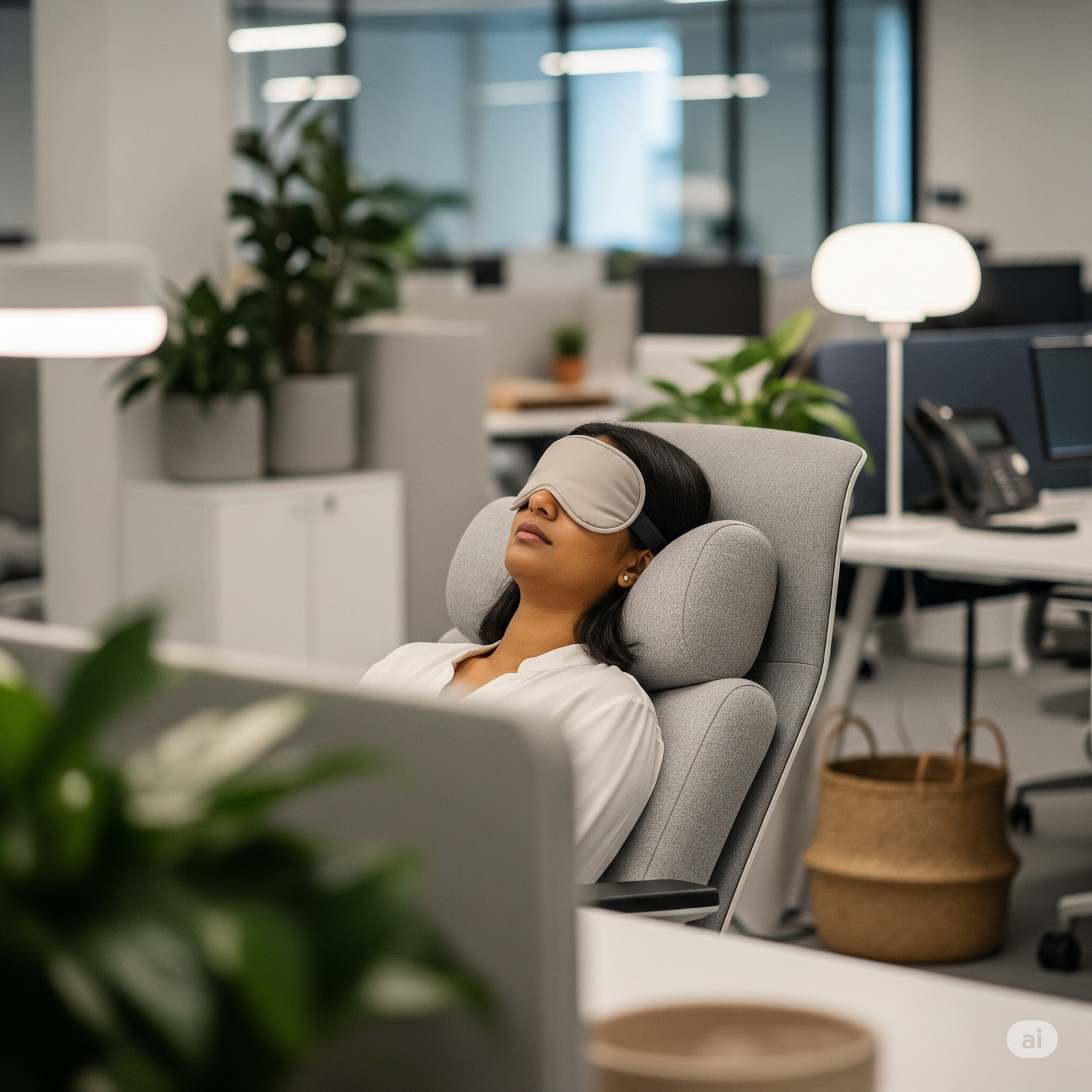
Long-Term Survival Tips for Shift Work Life
-
Be honest with your doctor about your schedule.
-
Keep consistent sleep/wake times even on off days.
-
Prioritize mental health. Night shifts mess with mood. Therapy ≠ weakness.
-
Check in with yourself regularly: Is this schedule sustainable?
-
Build a support system: Other night shift weirdos. Reddit. Shift-worker WhatsApp groups. You’re not alone.

Apps, Tech & Sleep Tools Worth Using
-
Smart alarms (e.g., Sleep Cycle) = wake up during light sleep, not full-zombie mode.
-
Blue light filters on screens (start 3 hours before bed).
-
White/brown noise apps: Different sounds for different situations.
-
Meditation/sleep stories (like Insight Timer or Calm). Look for ones made for shift workers.
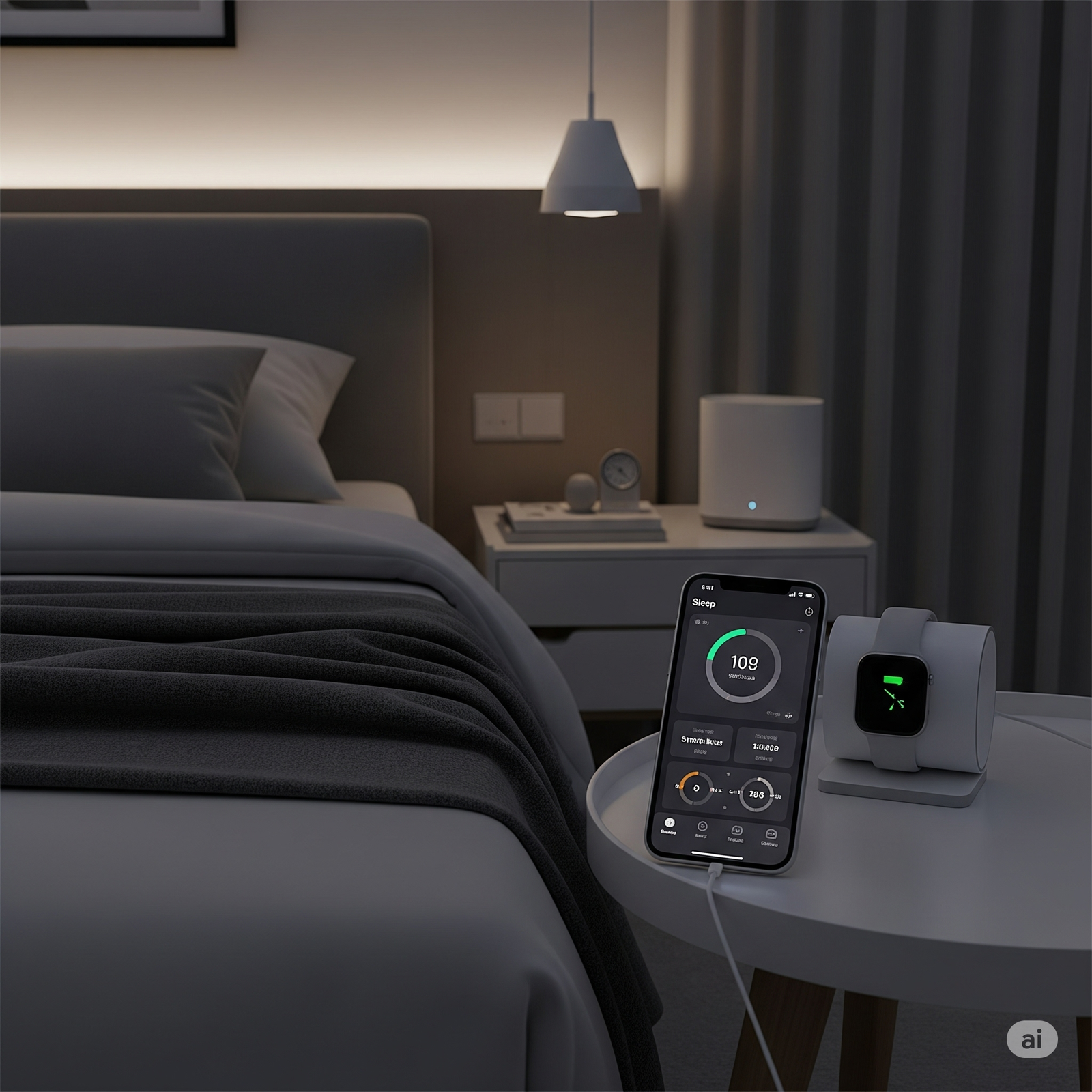
FAQs
How long does it take to adjust to night shift sleep schedules?
Most people need 2-4 weeks to begin adapting to night shift schedules, but full adaptation can take 2-3 months. Individual factors like age, genetics, and previous sleep habits affect adaptation speed. The key is maintaining consistency even when progress feels slow initially.
Should I try to switch back to normal sleep schedules on my days off?
No, constantly switching between day and night schedules prevents your body from adapting and increases the health risks associated with shift work. Maintaining consistent sleep and wake times, even on days off, leads to better long-term adaptation and health outcomes.
What's the best way to handle family events that happen during my sleep time?
Communication and compromise work best. For truly important events, you might adjust your sleep schedule slightly for one day, but this should be the exception rather than the rule. Most family members will understand and accommodate your schedule once they realize its importance for your health and safety.
Is it safe to drive home after a night shift if I'm tired?
Never drive when feeling drowsy, as this significantly increases accident risk. If you're too tired to drive safely, options include taking a 15-20 minute power nap in your car (safely parked), calling for a ride, or using public transportation. Your safety and the safety of others must take priority over convenience.
